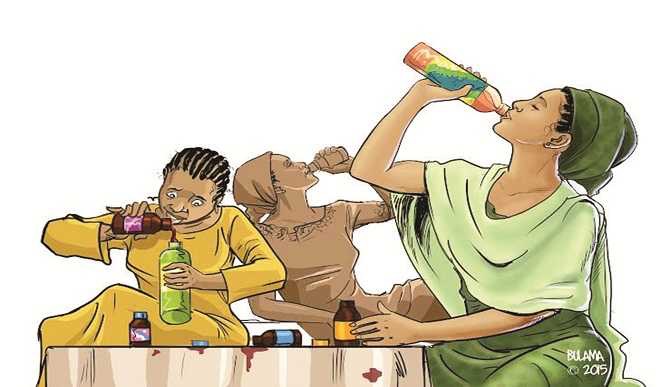“Though I still struggle with tramadol sometimes, I don’t take codeine and alcohol again said 17-year-old Halima who started abusing drugs when she was in JSS 2.
Halima’s voice reverberates with a renewed hope and courage to look to the future. She credits this continuing mental makeover to the mental health care and rehabilitation she got at a private health facility in Lagos.
Halima is one of the many fortunate teenagers that have turned the bend on drug abuse. Many more are still trapped in the web with little hope of getting the sort of help that can release from the grip of drugs.
The inappropriate use of substances including alcohol, medication, illegal drugs for fun, to perform more effectively, or to alter one’s perception of reality is not just a malaise that traverses the socio-cultural and economic layers of our society, it is undeniably a greater menace than we imagined especially amongst young persons, and we are probably waking up a little too late to it.
In Nigeria today, there are myriads of anecdotes on Nigerian adolescents and youths, addicted to substance abuse. Recent reports on ubiquitousness of this problem are alarming, revealing the prevalent abuse of tramadol and codeine in the country. According to the World Health Organisation (WHO) illicit drug use, alcohol, and tobacco are major global risk factors for disability and premature loss of life.
Earlier this year, Senate President Bukola Saraki expressed concern about the rising nuisance of drug abuse in the nation, while speaking at a public hearing on “The need to check the rising menace of pharmaceutical drug abuse among youths in Nigeria”.
“Drug abuse is an ill wind that blows nobody any good as many families are discovered to be affected including children and women. This has led to incidences of armed robbery, kidnapping, militancy and other vices, which have become a challenge to internal security, said Saraki.

“Unfortunately, some of our youths who could become the leaders of tomorrow are caught in the quagmire of substance-abuse. This is a threat to their health and wellbeing and a threat to their families so we must stem this tide. We are now working on a legislation to tighten the loose ends on this issue and to ensure control and that victims are rehabilitated.”
Some of the substances largely abused include tramadol, codeine, Tom Tom candy soaked in Lacasera, a fizzy drink, dry pawpaw or plantain leaves, rephnol, methylated spirit in codeine or coke, gum, Cannabis (Marijuana) soaked in gin and more. Majority of these substances can be cheaply purchased, for as low as N100.
Not only has spiking rate of drug abuse in Nigeria, especially in urban centres such as Lagos, Kano and Port Harcourt has contributed to increasing rate of mental illnesses, it is also contributing to the rate of crimes, said Dr Hope Abraham, the president of Vanguard Against Drug Abuse (VGADA).
While gender stereotypes and the belief that males are more likely to dabble into risky behaviours will have us believe that adolescent boys can be addicted faster, research has proven that, substance use can lead to abuse and addiction faster for adolescent girls than boys, even when the same amount or less of a specific substance is consumed.

Report by the National Institute on Drug Abuse shows that women only need to use smaller amounts of some drugs over a shorter period of time before they become addicted.
It also explains that women are more likely to suffer relapse after being treated for drug addiction and more likely to die from an overdose or other effects of some substances.
The reason for this incidence is the menstrual cycle of the woman. “The monthly cycle of a woman plays a major role with respect to drug abuse and their response to drug use,” Abraham said.
“Studies have shown that women who take cocaine during the follicular phase of the menstrual cycle, when the estrogen is higher tend to abuse the cocaine more frequently because they get more “high” during this phase. Their estrogen tends to accentuates their reception to substance use during the cycle.”
The incidence of drug abuse among young girls in Nigeria is frightening especially codeine cough syrups and over-the-counter drugs such as tramadol, rohypnol, and others.
While the issue of drug abuse among young girls and women in Nigeria is steadily gaining more attention, it is still underreported largely due to cultural constraints and societal discrimination against women and the dearth of national drug use surveys and other factual documentation regarding this issue in the country.
The propensity for adolescent and young females to be exposed to and be affected by drugs demands the formulation of gender-sensitive drug policies and programmes aimed at preventing and treating drug abuse among young girls and women.
This report is undertaken with support from Code For Africa to amplify the Gender Gap conversation






